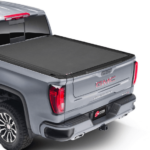Truck covers are a popular accessory for truck owners who want to protect their vehicles from the elements.
However, with so many different types of covers available, it can be challenging to determine which one is the best fit for your truck.
One important factor to consider when choosing a truck cover is the thickness of the material.
The thickness of a truck cover can affect its durability, weather resistance, and overall effectiveness at protecting your vehicle.
A thicker cover may provide better protection against rain, snow, and other harsh weather conditions, while a thinner cover may be more lightweight and easier to handle.
However, there is no one-size-fits-all answer to the question of what thickness is best for a truck cover, as different covers may be better suited for different types of trucks and different weather conditions.
Browse through our recommended premium truck covers available at EmpireCovers.com.
Understanding Truck Cover Basics

Truck covers, also known as tonneau covers, are essential accessories for any pickup truck owner. They protect the truck bed from the elements, keeping it clean and dry. There are several types of truck covers available, each with its own set of advantages and disadvantages.
Types of Truck Covers
The most common types of truck covers include soft tonneau covers, hard tonneau covers, retractable tonneau covers, and roll-up tonneau covers. Soft tonneau covers are made from materials such as fabric, vinyl, or canvas, and are the most affordable option. They are easy to install and remove but offer less security than hard tonneau covers.
Hard tonneau covers are made from materials such as aluminum or fiberglass and offer more security than soft covers. They are more durable and can withstand harsh weather conditions. Retractable tonneau covers are a combination of hard and soft covers, offering the best of both worlds. They are easy to use and provide excellent security.
Roll-up tonneau covers are made from materials such as vinyl or canvas and are similar to soft tonneau covers. They are easy to install and remove, and provide quick access to the truck bed. They are less expensive than hard covers but offer less security.
Importance of Cover Thickness
When choosing a truck cover, thickness is an important factor to consider. The thickness of the cover determines its durability and ability to withstand harsh weather conditions. Soft covers are generally thinner than hard covers, but there are still differences in thickness among soft covers.
The thickness of soft tonneau covers is measured in millimeters or ounces per square yard. The thicker the cover, the more durable it will be. Vinyl covers are generally thicker than canvas covers, and higher-quality covers are thicker than lower-quality ones.
Hard tonneau covers are generally thicker than soft covers, with fiberglass covers being the thickest. Aluminum covers are also thick but are lighter than fiberglass covers. The thickness of the cover is important for ensuring that it can withstand heavy loads and harsh weather conditions.
In summary, understanding the basics of truck covers is essential for choosing the right cover for your pickup truck. There are several types of truck covers available, each with its own set of advantages and disadvantages. The thickness of the cover is an important factor to consider, as it determines the cover’s durability and ability to withstand harsh weather conditions.
Factors Affecting Truck Cover Performance

When it comes to truck covers, there are several factors that can affect their performance. Here are some of the most important factors to consider when choosing a truck cover:
Weather Resistance
One of the most important factors to consider when choosing a truck cover is its weather resistance. A good truck cover should be able to protect your cargo from rain, snow, and other harsh weather conditions. Look for covers that are waterproof or at least water-resistant. Some covers are also breathable, which can help prevent moisture buildup inside the cover.
Durability and Protection
Another important factor to consider is the durability and protection offered by the cover. A good truck cover should be able to withstand the elements and protect your cargo from damage. Look for covers that are made from high-quality materials and have reinforced seams and edges. Some covers also come with additional features like locking mechanisms or clamps to provide extra security.
Ease of Use and Installation
Finally, it’s important to consider the ease of use and installation of the cover. A good truck cover should be easy to install and remove, and should fit securely on your truck bed.
Look for covers that come with installation hardware like rails, clamps, or straps, and make sure the cover is compatible with your truck’s make and model. Retractable covers and roll-up tonneau covers are also popular options that offer quick and easy access to your cargo.
Overall, choosing the right truck cover depends on your specific needs and preferences. Consider factors like weather resistance, durability, and ease of use when making your decision. With the right cover, you can protect your cargo and keep your truck looking great for years to come.
Explore our top-rated premium truck covers on EmpireCovers.com.
Selecting the Right Thickness for Your Truck Cover

When it comes to selecting the right thickness for your truck cover, there are several factors to consider. The thickness of the cover plays a crucial role in determining how well it can protect your truck bed from external elements and how functional it is to use. Here are some of the critical factors to keep in mind when choosing the right thickness for your truck cover.
Balancing Protection and Functionality
The thickness of the truck cover is directly proportional to the level of protection it can offer to the truck bed. A thicker cover can provide better protection against external elements such as rain, snow, and UV rays. However, a thicker cover can also make it difficult to access the truck bed, making it less functional.
Therefore, it’s essential to find a balance between protection and functionality when selecting the right thickness for your truck cover. A cover that is too thick may not be the best option if you need to access the truck bed frequently.
Matching Cover to Truck Bed Usage
It’s crucial to match the thickness of the truck cover to the intended usage of the truck bed. For example, if you use your truck bed for heavy-duty tasks, such as hauling large items or equipment, you need a thicker cover that can withstand the weight and pressure.
On the other hand, if you use your truck bed for light-duty tasks, such as transporting groceries or luggage, a thinner cover may be more appropriate. A thinner cover is easier to use and can be more functional for everyday use.
Other Factors to Consider
Apart from the thickness of the cover, there are other factors to consider when selecting the right truck cover. These include:
- Fit: The cover should fit your truck bed snugly to ensure maximum protection.
- Security: The cover should be secure and lockable to prevent theft and unauthorized access.
- Durability: The cover should be made of durable materials that can withstand wear and tear.
- Easy to use: The cover should be easy to open and close to provide convenience and ease of use.
- Installation: The cover should be easy to install without requiring special tools or expertise.
- Retractable, folding tonneau cover, or roll-up tonneau cover: Depending on your preference, you can choose a retractable, folding tonneau cover, or a roll-up tonneau cover.
- Struts: Some covers come with struts that help to lift and support the cover when it’s open.
- Bed length: Make sure to choose a cover that fits the length of your truck bed.
By considering these factors, you can select the right thickness for your truck cover that balances protection and functionality.
Click here to check out our curated selection of premium truck covers.
Additional Considerations for Truck Cover Selection

When selecting a truck cover, there are additional considerations beyond just the thickness of the material. These considerations include aesthetic and design preferences, as well as budget and value for money.
Aesthetic and Design Preferences
Truck owners may have specific aesthetic and design preferences when it comes to their truck cover. Some truck covers are designed to provide a sleek look, while others may have a more rugged appearance. It is important to consider these design preferences when selecting a truck cover.
Budget and Value for Money
Budget is also an important consideration when selecting a truck cover. Some truck covers may be more affordable than others, but it is important to consider the value for money as well. A truck cover with a lifetime warranty or limited lifetime warranty may be a better investment in the long run, as it can save money on repairs or replacement.
Other factors to consider when selecting a truck cover include its impact on fuel efficiency and gas mileage. A truck cover that is aerodynamically designed can reduce aerodynamic drag and improve fuel efficiency. Additionally, a custom fit or semi-custom fit truck cover can provide better protection and a more secure fit than a generic cover.
In summary, when selecting a truck cover, it is important to consider more than just the thickness of the material. Aesthetic and design preferences, budget and value for money, and other factors such as fuel efficiency and fit should also be taken into account.
The brand or manufacturer is also an important consideration. There are many great choices out there, so finding the perfect one for your specific needs can be a rewarding process. If you are looking for durability, weather resistance, and a snug fit, EmpireCovers is a great option.
By considering these factors, truck owners can select the best truck cover for their needs.
In Conclusion
When it comes to choosing the right thickness for a truck cover, there are a few things to consider. The first is the climate in which the truck will be stored. If the truck is going to be stored in an area with harsh winters, a thicker cover will offer better protection against snow and ice. On the other hand, if the truck will be stored in a warmer climate, a thinner cover may be more appropriate.
Another factor to consider is the overall durability of the cover. A thicker cover may be more durable and able to withstand wear and tear from the elements, but it may also be heavier and more difficult to handle. A thinner cover may be easier to handle, but may not offer as much protection against the elements.
Ultimately, the best thickness for a truck cover will depend on the specific needs of the truck owner. It is important to consider the climate, durability, and ease of use when choosing a cover. By taking these factors into account, truck owners can ensure that their vehicle is protected and well-maintained for years to come.









